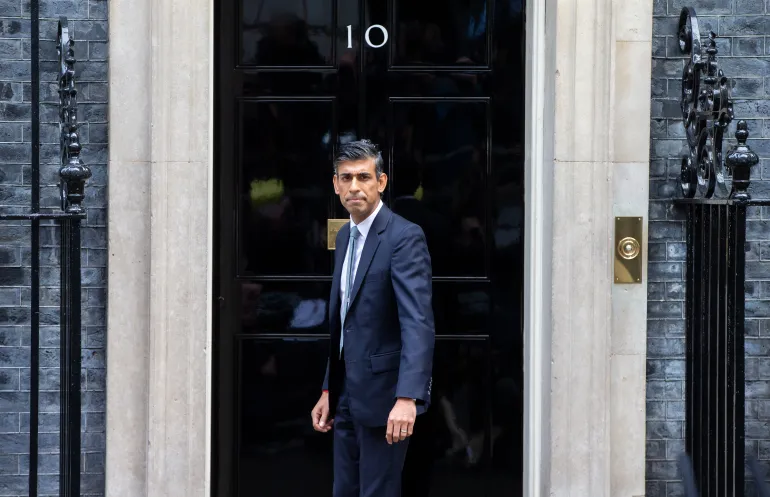UK prepares to give the boot to worst ever British government


On July 4, British voters will elect lawmakers to fill all 650 seats in the House of Commons, and the leader of the majority who will become prime minister. Polls give a comfortable victory to the Labour opposition. UK snap election is Rishi Sunak’s response to the severe defeat the Conservative Party suffered in the last local elections, where the Tories achieved their worst results in the last 40 years.
The British Conservative party will leave Downing Street after 14 years and 5 incompetent prime ministers who have left Britain poorer and weaker. Trade and investment flows have shrunk. The promised trade deals with India and the US have not followed Brexit. Workers from continental Europe have been replaced by much larger numbers of Asians and Africans. The dismal state of the National Health Service, the fact that there seems to be more foodbanks than McDonalds, the broken railways, rivers overflowing with sewage, or growing child poverty, tell the story of a country which has reverted to its status before Margaret Thatcher came to power in 1979, that of the sick man of Europe. More than at any time in modern history, Britain has lost the respect of the world.
Prime Minister Rishi Sunak relentless bid for the votes of the elderly frames the election as a chance to reclaim the past: national service for 18-year-olds (military chiefs dismiss it with scorn), tax breaks for pensioners, cutbacks in courses for feckless students, refugees expelled to Rwanda… All of it suggests Sunak will be lucky if he gets the backing of more than 10% of the 18-24 age bracket.
In this sense, Brexit was the ultimate exercise in nostalgia. But hauling up the drawbridge with the rest of the European continent has not allowed Boris Johnson, Liz Truss and Rishi Sunak to rediscover Britain’s past glory. Britain has become poorer, meaner. A Downing Street strategic review pushed aside what the Tories felt was a “parochial” preoccupation with Europe, only to wake up the next day with Russia invading Ukraine.
Many British people would agree with the Financial Times US National Editor, Edward Luce, when he writes: “July 4 is my second favourite US holiday after Thanksgiving. This year, however, I will be primed to celebrate Independence Day with un-English abandon. Since it coincides with the British general election, that will be the day when my compatriots will award the Order of the Boot to the least competent UK government in my life – indeed, the worst since Lord North blundered his way into the American Revolution.” He describes the Tory government as an “omnishambolic clusterfuck”, strong words which sum up the feeling of many British people and non-British who had learned to respect a country whose politics, financial and commercial nous, sport and arts had done so much over the past two centuries to shape the modern world.
The Conservative Party has become the latest casualty of Brexit. However, that policy itself is not the only nor indeed the root cause which explains why the Tories are starring into an electoral abyss. Voters have concluded that they have been governed by serial incompetents for fourteen years and that the country is in worse state than in 2016, let alone 2010. They have not forgotten the spending cuts – far worse than anything practised in Europe – imposed on them by the minister of finance, George Osborne, and the prime minister David Cameron in the wake of the 2008-9 financial crisis.
Those who promoted Brexit elevated ideology over pragmatism, purged their most talented leaders and unleashed a form of populist policies unheard of in the UK. The Conservatives abandoned pragmatism and chased former Labour Party supporters who had voted for Brexit with promises to “level up” the poorer North in the 2019 election. Defeat in these so called “red wall” seats will cost the Tories their majority, but by neglecting voters who are graduates, city dwellers and other supporters in the South, they risk an electoral wipe out. Brexit fostered unconservative instincts among Tory MPs. The first is that the end justifies the means. The second is the Trump inspired tendency to depict core institutions of British democracy, notably the courts and the civil service, as enemies of the people. Rules, laws and essential bodies could be publicly thrashed. Such behaviour left many electors, including Tories, dumfounded.
Meanwhile, the populist Nigel Farage has erupted into British politics like “the sonorous belch that warns of a meal undigested”, as “the scorn for a Westminster class”, and “the lament for a country in social, economic and moral decline; the warning that mass immigration is gobbling scarce public resources”. These are the words of the Guardian columnist, Rafael Behr, about Farage's return: “it is the dish cooked up for Brexit, now back on the menu under the Reform UK brand”. Farage will appeal (as he has always had) to older, white, non-graduated British worried about crime and immigration, people who are doubtful that politics makes much difference. For almost two decades, successive Conservative leaders have appeased Farage. The consequences have been disastrous for the party and the country.
The last prominent Tory to take Farage on was David Cameron in 2006, when he described UKIP as “a sort of bunch of fruitcakes and losers and closet racialists”. Cameron characterised UKIP as a “stop the world, I want to get off party”. Farage is an amplifier of impotent rage who, for a quarter of a century, has offered fantasy slogans whose cost far outweigh any benefits. He has never been a provider of practical solutions. His project is to take Britain further right and his power rests on the influence of a very nasty and xenophobic right-wing press, whose influence many foreign observers underestimate. Such people see leaving the EU and denying migrant workers their rights as essential, while taxing the rich and investing in public services as swivel-eyed Marxism.
Britain is not about to reverse Brexit. The EU has no interest in such negotiations until and unless it becomes the settled will of British politicians across the spectrum. Brussels will not allow the incoming prime minister, most likely the Labour leader Keir Starmer, to cherry pick the areas of cooperation he wants in any new government agreement with Brussels. Yet sustained economic recovery in Britain will depend on a closer, less obstructed relationship with the EU —which accounts for most of the country’s trade and investment. Nor can the UK underpin its security without the EU. The Tories have stopped talking about Brexit, but the incoming British prime minister will not have that luxury. The conspiracy of silence on the state of the economy which characterises this electoral campaign cannot last beyond election day. A huge Labour majority (and a Conservative party swallowed up in a bitter fight about how reactionary it wants to become) would offer the new prime minister a unique opportunity to liberalise planning restrictions, which make building large infrastructure projects more expensive in the UK than in comparable states, and reform property taxation. Dare one hope for a large Labour majority and a bold Keir Starmer?
All the publications express the opinions of their individual authors and do not necessarily reflect the views of CIDOB or its donors.